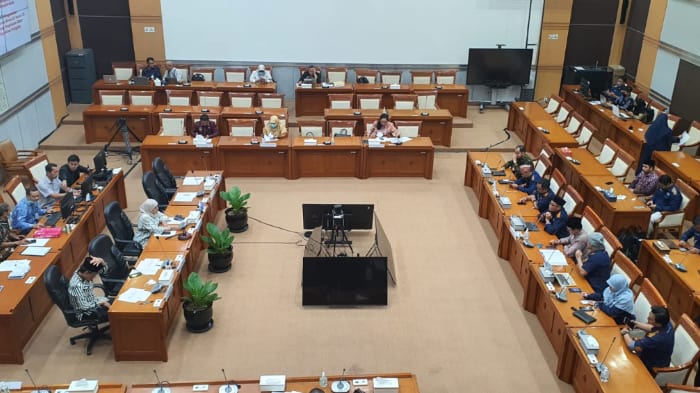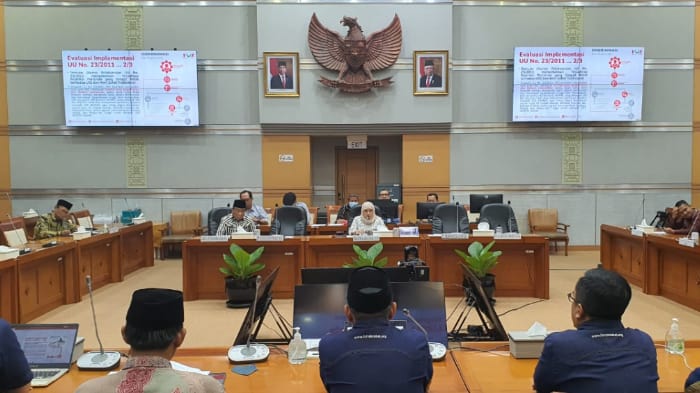JAKARTA — Dompet Dhuafa and other institutions that are members of the Forum Zakat (FOZ) encourage the revision of the Zakat Management Law or Undang-undang Pengelolaan Zakat (UUPZ) to strengthen the zakat ecosystem. Dompet Dhuafa Program Director Bambang Suherman explained that the findings of substantive weaknesses in Law No. 23/2011 on UUPZ have hampered the role and participation of the community in the management of zakat funds.
At the Public Hearing Meeting or Rapat Dengar Pendapat Umum (RDPU) held by Commission VIII at Nusantara 2 Building of the House of Representatives of the Republic of Indonesia, Senayan, Jakarta, Monday (10/4/2023), three points of findings of substantive weaknesses in the UUPZ were mentioned. First, in Law 23/2011, there is a contradictory function of BAZNAS, namely as a regulator and operator. This creates a conflict of interest for BAZNAS in LAZ licensing.
Of the 18 National Amil Zakat Institutions or Lembaga Amil Zakat Nasional (LAZNAS) that existed in Law No. 38/1999, continued Bambang, only 10 LAZs were able to survive to obtain licenses as LAZNAS in the era of Law No. 23/2011. In addition, there are complexities in obtaining permits to establish Amil Zakat Institutions in the era of Law No.23/2011 compared to the era of Law No.38/1999.
“Previously, the Indonesian Ombudsman also issued the results of a rapid assessment stating that the recommendation function at BAZNAS has the potential to conflict of interest in granting permits. In fact, many LAZs are not granted permits, causing uncertainty about the status and operations of LAZ,” he added.
Also Read: FOZ Gelar Diskusi Tinjau UU Zakat: Catatan Teoritis Melihat Perundang-undangan

Second, the law also marginalizes traditional amils, namely individual amils or those affiliated with pesantren, mosques, and private employees. Even further, it could potentially criminalize communities that administer zakat without permission. This hinders community participation in managing zakat funds.
“As is known, mosques and Islamic boarding schools across Indonesia are involved in solving poverty cases in their neighbourhoods. The source (of funds) is from zakat funds collected by the community. However, the construction of regulations makes these traditional amils very vulnerable to criminal articles in the UUPZ because they cannot meet the requirements in the law,” he explained.
Third, implementing the Zakat Collection Unit (UPZ) kills the participation of LAZ formed by the community. BAZNAS attracts collection funds from corporate-affiliated institutions or SOEs amounting to 30% of the collection. This 70:30 UPZ scheme in LAZ’s perspective, has a weak legal foundation. Furthermore, this scheme reduces the usefulness of mustahik and interferes with the resilience of zakat institutions.
“The Zakat Forum also (even) indicates the low accountability and transparency of the 30% fund managed by BAZNAS,” said Bambang who also serves as Chairman of the Zakat Forum.
Also Read: Irwansyah Ajak Masyarakat Zakat di Dompet Dhuafa

He also stated that there was an attempt to conduct a licensing transaction from BAZNAS by forcing the parent corporation of LAZ to become UPZ under the 70:30 scheme before granting permission to the LAZ concerned. At the same time, the LAZ in question will likely become a LAZ without the UPZ scheme.
These things certainly hinder community participation in managing zakat funds. In fact, many community zakat institutions have contributed to the development, poverty, and humanitarian issues but have yet to become unlicensed institutions due to various existing obstacles. This is counterproductive to the government’s desire to achieve the SDGs and reduce extreme poverty by 0% by 2024.
The Zakat Forum presented these findings in the presence of the leaders of Commission VIII of the House of Representatives, namely the Deputy Chairman of Commission VIII of the House of Representatives, Diah Pitaloka, S.Sos., M.Si and Laksdya TNI (Ret.) Moekhlas Sidik., MPA., Members of Commission VIII of the House of Representatives, Paryono, M.H, Esti Wijayati, Hj. Nur Azizah Tahmid, Hidayat Nur Wahid, and M Husni, S.E. (Dompet Dhuafa/FOZ/Muthohar)



